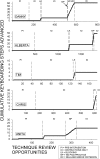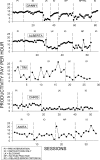Modification of perseverative responding that increased earnings but impeded skill acquisition in a job-skills training program
- PMID: 20190923
- PMCID: PMC2741061
- DOI: 10.1901/jaba.2009.42-627
Modification of perseverative responding that increased earnings but impeded skill acquisition in a job-skills training program
Abstract
Adults in a therapeutic workplace working on a computerized keyboarding training program earned vouchers for typing correct characters. Typing technique was evaluated on review steps. Participants could pass the review and earn a bonus, or skip the review and proceed with no bonus. Alternatively, participants could continue practicing on the same step. Participants persistently repeated the same step, which halted progress through the program but allowed them to increase their rate of responding and, as a result, their earnings. Blocking the initiation of practice on review steps and removing payment for practice initiated after prompts (extinction) both produced rapid progress through the program. These results underscore the importance of careful arrangement of the contingencies in adult education programs.
Keywords: addiction; extinction; job skills training; response blocking; voucher reinforcement.
Figures




Similar articles
-
Reinforcing Productivity in a Job-Skills Training Program for Unemployed Substance-Abusing Adults.Behav Anal (Wash D C). 2017 May;17(2):114-128. doi: 10.1037/bar0000077. Epub 2017 Feb 2. Behav Anal (Wash D C). 2017. PMID: 28824954 Free PMC article.
-
Voucher-based reinforcement of attendance by unemployed methadone patients in a job skills training program.Drug Alcohol Depend. 1996 Jul;41(3):197-207. doi: 10.1016/0376-8716(96)01252-5. Drug Alcohol Depend. 1996. PMID: 8842632
-
Performance pay improves engagement, progress, and satisfaction in computer-based job skills training of low-income adults.J Appl Behav Anal. 2013 Summer;46(2):395-406. doi: 10.1002/jaba.51. J Appl Behav Anal. 2013. PMID: 24114155 Free PMC article.
-
Naltrexone and dysphoria: fact or myth?Am J Addict. 2002 Spring;11(2):151-60. doi: 10.1080/10550490290087929. Am J Addict. 2002. PMID: 12028745 Review.
-
Establishing and maintaining job skills and professional behaviors in chronically unemployed drug abusers.Subst Use Misuse. 2007;42(7):1127-40. doi: 10.1080/10826080701407952. Subst Use Misuse. 2007. PMID: 17668329 Review.
Cited by
-
A potential role of anti-poverty programs in health promotion.Prev Med. 2016 Nov;92:58-61. doi: 10.1016/j.ypmed.2016.05.023. Epub 2016 May 25. Prev Med. 2016. PMID: 27235603 Free PMC article.
References
-
- Bos J.M, Scrivener S, Snipes J, Hamilton G. Improving basic skills: The effects of adult education in welfare-to-work programs. New York: Manpower Demonstration Research Corporation; 2002. (ERIC Document Reproduction Service No. ED464267)
-
- Dillon E.M, Wong C.J, Sylvest C.E, Crone-Todd D.E, Silverman K. Computer-based typing and keypad skills training outcomes of unemployed injection drug users in a therapeutic workplace. Substance Use and Misuse. 2004;39:2325–2353. - PubMed
-
- Donlin W, Knealing T, Silverman K. Employment-based reinforcement in the treatment of drug addiction. In: Higgins S.T, Silverman K, Heil S.H, editors. Contingency management in substance abuse treatment. New York: Guilford; 2008. pp. 314–333. In.
-
- Hamilton G. Moving people from welfare to work: Lessons from the national evaluation of welfare-to-work strategies. New York: Manpower Demonstration Research Corporation; 2002. (ERIC Document Reproduction Service No. ED469794)
Publication types
MeSH terms
Substances
Grants and funding
LinkOut - more resources
Full Text Sources
Medical

